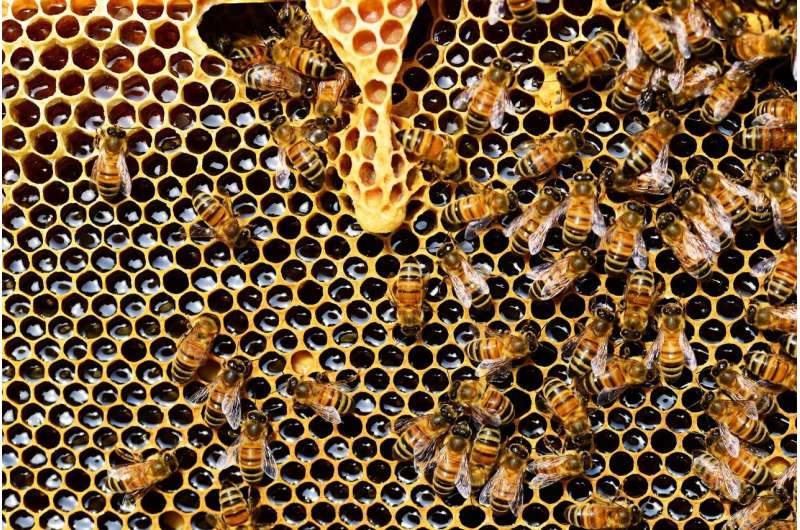This article has been reviewed according to Science X's editorial process and policies. Editors have highlighted the following attributes while ensuring the content's credibility:
fact-checked
trusted source
proofread
Propolis found to improve immunity, reduce free radicals and attenuate chronic inflammation in HIV patients

An article published in the journal Biomedicine & Pharmacotherapy demonstrates the beneficial effects of consuming 500 milligrams (mg) per day of propolis for people living with HIV, the virus that causes AIDS. The authors found that the group given propolis, unlike the group given placebo, displayed a significant reduction in plasma levels of malondialdehyde, a marker of oxidative stress. Total antioxidant capacity increased slightly in the same group, reflecting the direct combating of free radicals.
"Although people living with HIV have excellent life expectancy thanks to existing therapies, one of the problems still faced is the question of premature aging—between 10 and 20 years compared with the non-infected population. They suffer from immunosenescence as immunity deteriorates rapidly, with early onset of diabetes, high blood pressure and neoplasia," said biologist Karen Ingrid Tasca, first author of the article. The study was part of her postdoctoral research at São Paulo State University's Botucatu Institute of Biosciences (IBB-UNESP) in Brazil.
This process of premature aging is due to constant activation of the immune system and chronic inflammation. According to Tasca, oxidative stress "goes hand in hand" with these two problems and must therefore be controlled.
"The oxidative stress caused by the virus and anti-retroviral therapy has very adverse effects on these patients," she explained. "Interventions that minimize these effects are required in order to try to reduce these pathological processes and improve the patient's quality of life and survival. Among several natural products available for this purpose, propolis, which is a resin, has this potential, thanks to its recognized anti-oxidative, anti-viral and anti-inflammatory properties."
Professor José Maurício Sforcin, last author of the article, has studied the effects of propolis for almost 30 years at IBB-UNESP. "I've investigated the immunomodulating activity of propolis to increase our knowledge of its action mechanisms in cells involved in immunity. A great deal of research on the biological activities of propolis has been done in vitro, in cultured cells, and also in vivo, in experiments involving animal models, especially mice. More clinical trials are needed to reveal the potential benefits for human health of this resin produced by bees," Sforcin said.
Despite the evidence of health benefits, research has never before been done into the effects of propolis on people living with HIV. "There were in vitro findings showing that some components of propolis could potentially inhibit viral replication and studies of people with chronic diseases such as diabetes, but at the time we started out, there was nothing in the literature on the effects of propolis for this specific group, and we realized our research was urgently needed," Tasca said.
In earlier work, also reported in Biomedicine & Pharmacotherapy, the researchers had already demonstrated that propolis decreased oxidative stress and mitigated inflammatory parameters in HIV patients. That study evidenced an increase in proliferation of CD4+ T cells, considered the virus's main target, and increased expression of the transcription factor Foxp3, a marker of regulatory T cells (Tregs), important gatekeepers of the immune system and modulators of inflammation.
"The results show propolis to be an alternative to improve the immune response and reduce inflammation in asymptomatic patients. Infection by HIV leads to intense dysregulation of the immune system, loss of cellular functionality and chronic inflammation. Persistent immune system activation and inflammation require attention as they are potential determinants of morbidity and mortality not associated with AIDS, even in patients undergoing treatment and with adequate viral suppression," said Fernanda Lopes Conte, second author of the article and a researcher at IBB-UNESP. Conte earned a Ph.D. in pathology from the Botucatu Medical School (FMB-UNESP).
The researchers monitored the dietary and health habits of the 40 participants (half of whom received propolis) during the 90 days of the intervention to guarantee the fidelity of the data and ensure the results were not influenced by possible behavioral changes. This context was studied by Ana Claudia de Moura Moreira Alves. There the researchers observed an absence of adverse events in the group given propolis and an increase in serum levels of magnesium, an element that contributes to homeostasis. There were no changes in the nutritional, metabolic or biochemical profiles of the participants during the period, after successive analyses of their diet and bioimpedance.
To prioritize the health and safety of the participants, the study sample included only patients who were undergoing anti-retroviral treatment, had undetectable viremia levels and the ideal CD4+ T cell count. According to the researchers, more studies are needed before propolis can be adopted in effective interventions for patients with comorbidities or therapeutic failure.
More information: Karen Ingrid Tasca et al, Propolis consumption by asymptomatic HIV-individuals: Better redox state? A prospective, randomized, double-blind, placebo-controlled trial, Biomedicine & Pharmacotherapy (2023). DOI: 10.1016/j.biopha.2023.114626





















